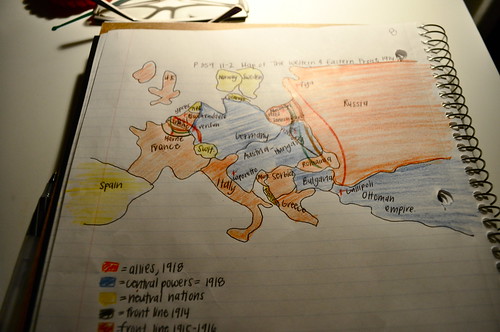
Photo Credit: Nicole_Vi via Compfight cc
Much like old William pondered in Hamlet, I too ponder now… to Google or not to Google? This second debate really had me questioning my views on the usage of Google in the classroom and in all aspects of life. Are we becoming too reliant on the quick easy answers? Or, is it okay to have quick and easy answers as long as it leads to more questions? Or can it just lead to trouble? Just ask Sheldon.
The agree side made excellent points on how Google is in a way “weakening” our students and society as a whole. It seems that Google is just making us wanting the answers without examining the topics in more depth. Terry Hierck made some excellent points in his article such as …”Google is easier than thinking” and that “they find what they want rather than what they might need”. Is Google making us “lazy”? Are we gearing away from inquiry based learning? Hierck also states “if users can Google answers to questions they’re given, they’re likely terrible questions”. Therefore, maybe it isn’t Google that is the issue, rather the educator that asks the question.
Ramsey Musallam made some very relevant points of interest during his TED talk, mainly around having students question. He focused on encouraging students to be curious and inquiry. “If we place technologies before students inquiry, we are robbing us (the teacher) of the greatest tool… student questions”. There is place for technology such as Google but it is based on the questions that arise from the curious minds of students. Having students do more than learn facts is very important in any classroom.
During my pre-internship (back in 1995…wow that was long ago) I was in an amazing teachers room – Mr. Ted Weir. Ted had the ability (without the use of the internet) to challenge students to think for themselves. During his Unit on World War One,

Photo Credit: nicolecurtis_ via Compfight cc
he would break the class into nations and give them some basic information about their nation and some (but not all) of the surrounding ones. They would role play the entire war by simply asking questions of him and the other nations. He played the role of “the all knowing” and they ran ideas by him first before acting them out. This process lead to the students asking questions and learning, not from facts but from actually playing the events out without the knowledge of what actually took place. It was very interesting to watch him direct kids and observe them make decisions that actually took place in history without Googling the answers (which they couldn’t do back then). This process of encouraging students to ask questions and “think” for themselves is lost in many classrooms today because answers can be found very quickly and easily.
Now with that all stated, can the disagree side be unto something with their argument? I believe they also made some great points about the importance of still teaching things that can be Googled. Their emphasis on students having the ability to learn things in class that can still be found easily on Google is something that many teachers believe in. Memorization is important, therefore we must still have students memorize things such as poems and soliloquies. As William R. Klemm’s states in his article “the more you know, the more you can know” therefore memorization will help “train the brain”. This notion is continued by Ben Johnson who believes “the brain is a learning tool” and that “before students can think critically, they need to have something to think about in their brains”. So we need to encourage kids to learn certain facts and figures to encourage more in depth, critical thinking later on.
Overall it is the questioning that can and should lead to students wanting to learn more. As a former History teacher I found some merit in some information found on Google (and the internet), but it was the inquiry learning that was the main focus. Sure we could find information from the internet, but what do we do with that information is the most important thing. For example Louis Riel, we could find information about him on Google (if we so desired) and than ask questions such as was he truly a criminal? Was he right or wrong? Use the basic information and get students to think about it. Asking the right question can lead students to so much more – having them ask the questions is even better because it shows their critical thinking. It is the educator that must be the one to encourage students to question information they obtain in class or from the internet. Encourage them to ask why? How come? What if? and so on. Questioning by the teacher and the student leads to better critical thinking by all.
The following video demonstrates the importance of good questions – if we as educators can encourage students to question they will learn so much more. They may also teach us a few new things but even questioning us.
I agree with your point that “Overall it is the questioning that can and should lead to students wanting to learn more”. This is great reminder for us, as teachers, to keep things student centered when debating the use of technology in the classroom. This is also reminds us of the importance of inquiry learning and also developing students into critical thinkers and with that comes asking questions and interrogating or disrupting narratives. Great post this week!
LikeLike
I believe that encouraging our kids to be more critical thinkers is sometimes a very hard task. I think we need to teach them the importance of ask more questions.
LikeLike
So funny that we both came up with the same title this week. 🙂 angela
LikeLike
Pingback: Let’s Google It? | Justine Stephanson's Blog